牛津译林7B Unit 2 Neighbours Period4课时学案设计(无答案)
牛津译林版英语七下Unit 2《Neighbours》(Task)教学设计

牛津译林版英语七下Unit 2《Neighbours》(Task)教学设计一. 教材分析牛津译林版英语七下Unit 2《Neighbours》主要介绍了关于邻居的话题。
通过学习本单元,学生能够掌握与邻居相关的词汇和表达方式,学会如何描述邻居的特点和习惯,以及如何用英语进行简单的日常交流。
本单元的主要语言点包括形容词和副词的比较级和最高级形式,以及一般现在时态的运用。
二. 学情分析七年级的学生已经具备了一定的英语基础,能够听懂并运用一些基本的英语句型进行交流。
但是,对于形容词和副词的比较级和最高级形式以及一般现在时态的运用可能还不够熟练。
因此,在教学过程中,需要注重对这些语言点的讲解和操练,以确保学生能够正确运用。
三. 教学目标1.知识目标:–能够听懂、会说、会读本单元的生词和重点句子。
–掌握形容词和副词的比较级和最高级形式。
–学会用英语描述邻居的特点和习惯。
–能够运用一般现在时态进行简单的日常交流。
2.能力目标:–能够运用本单元所学知识进行简单的对话交流。
–能够正确运用形容词和副词的比较级和最高级形式。
3.情感目标:–培养学生对邻居的尊重和关心。
–培养学生的团队协作精神。
四. 教学重难点1.教学重点:–形容词和副词的比较级和最高级形式。
–一般现在时态的运用。
–与邻居相关的词汇和表达方式。
2.教学难点:–形容词和副词的比较级和最高级形式的运用。
–一般现在时态的运用。
五. 教学方法1.任务型教学法:通过设定各种任务,让学生在实际语境中运用所学知识,提高学生的语言运用能力。
2.情境教学法:创设各种生活情境,让学生在真实的语境中学习英语。
3.合作学习法:引导学生进行小组讨论和合作,培养学生的团队协作精神。
六. 教学准备1.教学课件:制作课件,包括本单元的生词、句子、图片等。
2.教学材料:准备与邻居相关的图片、故事等材料。
3.教学设备:投影仪、电脑等。
七. 教学过程1.导入(5分钟)利用课件展示与邻居相关的图片,引导学生进行观察和思考,引出本课的主题。
牛津译林版英语七下Unit 2《Neighbours》(welcome to the unit)教学

牛津译林版英语七下Unit 2《Neighbours》(welcome to the unit)教学设计一. 教材分析牛津译林版英语七下Unit 2《Neighbours》主要讨论了与邻居相关的日常交流用语。
通过本单元的学习,学生将能够掌握与邻居交流的基本用语,描述邻居的特点以及日常生活中与邻居的互动。
本单元主要包括以下几个部分:welcome to the unit、read and write、listen and say、look and say、task、self-check以及word bank。
二. 学情分析学生在进入七年级下学期时,已经具备了一定的英语基础,能够进行简单的英语听说读写活动。
但部分学生对于日常英语交流仍感到困难,特别是在实际应用中,可能出现表达不准确或胆怯的情况。
因此,在教学过程中,需要关注学生的个体差异,鼓励他们积极参与课堂活动,提高他们的自信心。
三. 教学目标1.知识目标:学生能够掌握与邻居交流的基本用语,描述邻居的特点以及日常生活中与邻居的互动。
2.能力目标:学生能够在实际情景中运用所学知识进行日常英语交流,提高他们的口语表达能力。
3.情感目标:学生能够学会尊重他人,培养良好的邻里关系。
四. 教学重难点1.重点:学生能够掌握与邻居交流的基本用语,描述邻居的特点以及日常生活中与邻居的互动。
2.难点:学生在实际情景中运用所学知识进行日常英语交流,特别是听力和口语能力的运用。
五. 教学方法1.情境教学法:通过设置各种与邻居相关的实际情景,让学生在情境中学习与练习英语。
2.交际教学法:鼓励学生积极参与课堂互动,进行真实的英语交流。
3.任务型教学法:通过完成各种任务,让学生在实践中运用所学知识。
六. 教学准备1.教师准备:提前熟悉教材内容,了解学生的学习情况,设计合理的教学活动和任务。
2.学生准备:预习教材内容,了解本单元的学习目标。
七. 教学过程1.导入(5分钟)教师通过提问方式引导学生回顾上一单元学到的内容,如家庭成员的称呼和特点。
牛津译林版七年级英语下册Unit2Neighbours教案4
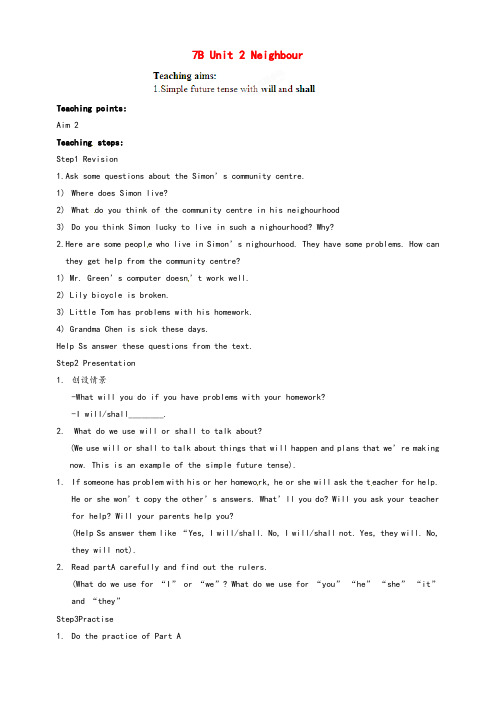
7B Unit 2 NeighbourTeaching points:Aim 2Teaching steps:Step1 Revision1.Ask some questions about the Simon’s community centre.1)Where does Simon live?2)What do you think of the community centre in his neighourhood3)Do you think Simon lucky to live in such a nighourhood? Why?2.Here are some peopl e who live in Simon’s nighourhood. They have some problems. How canthey get help from the community centre?1) Mr. Green’s computer doesn’t work well.2) Lily bicycle is broken.3) Little Tom has problems with his homework.4) Grandma Chen is sick these days.Help Ss answer these questions from the text.Step2 Presentation1.创设情景-What will you do if you have problems with your homework?-I will/shall________.2. What do we use will or shall to talk about?(We use will or shall to talk about things that will happen and plans that we’re making now. This is an example of the simple future tense).1.If someone has problem with his or her homewo rk, he or she will ask the t eacher for help.He or she won’t copy the other’s answers. What’ll you do? Will you ask your teacher for help? Will your parents help you?(Help Ss answer them like “Yes, I will/shall. No, I will/shall not. Yes, they will. No, they will not).2.Read partA carefully and find out the rulers.(What do we use for “I” or “we”? What do we use for “you” “he” “she” “it”and “they”Step3Practise1.Do the practice of Part A(Simon’s computer is broken. He’s asking Mr. Lin for help. Please complete their conversation with the simple future tense.2.Read the dial ogue about Mr Lin and Simon’s.Step4 Presentation1.创设情景(Do you think community centers a re helpful? I think they are. The community centre in my nighourhood is going to have a “helping hands’ meeting the day after tomorrow. I’m going to teach ch ildren English songs. My daughter is going to dance for the old people. My parents are going to cook some delicious food.2.What do we use be going to to talk about?(We use be going to to talk about something we decide to do and things that will probably happen).3.1)Are you going to join the “helping hand” meetin g in your neighourhood?2)Is your father going to do sth for the old people?3)What’s he going to do ?4) What’s your mother going to do?5)What are your neighours going to do ?4.Look at the part B and find out the rulers.Step4 Practiceplete part B(Simon is telling Amy about his plan for a day o ut with his uncle’s family. Please help him complete his plan).2.Answ er these questions with your partner.1)What are you going to do for old people this Sunday?2)What’s your father/mother going to do for your neighours tomorrow?3)What are you going to do for poor children the day after tomorrow?4)What’s your father/mother going to do for your community next week?。
牛津译林版英语七下7B_Unit_2_Neighbours教案
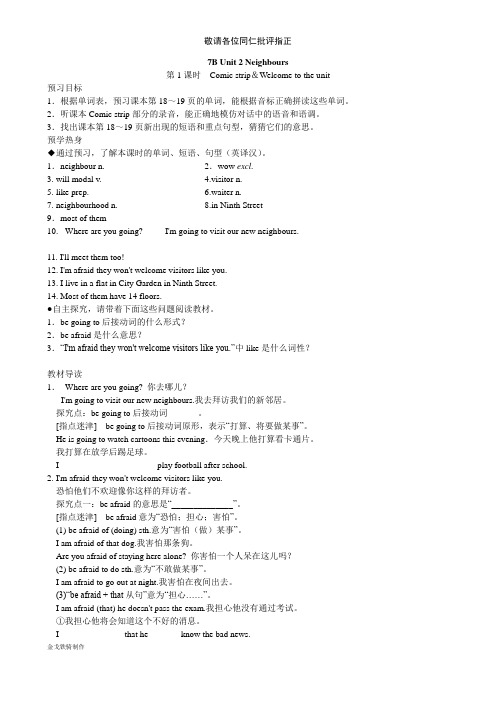
7B Unit 2 Neighbours第1课时Comic strip&Welcome to the unit预习目标1.根据单词表,预习课本第18~19页的单词,能根据音标正确拼读这些单词。
2.听课本Comic strip部分的录音,能正确地模仿对话中的语音和语调。
3.找出课本第18~19页新出现的短语和重点句型,猜猜它们的意思。
预学热身◆通过预习,了解本课时的单词、短语、句型(英译汉)。
1.neighbour n. _______ 2.wow excl._______3. will modal v._______4.visitor n._______5. like prep._______6.waiter n._______7. neighbourhood n._______ 8.in Ninth Street_______9.most of them_______10. - Where are you going? - I'm going to visit our new neighbours._____________________________________________________________________11. I'll meet them too! ________________________________________________________12. I'm afraid they won't welcome visitors like you.___________________________________13. I live in a flat in City Garden in Ninth Street.___________________________________14. Most of them have 14 floors.________________________________________________●自主探究,请带着下面这些问题阅读教材。
牛津译林版七年级下册Unit 2《Neighbours》(Study skills)教学设计

牛津译林版七年级下册Unit 2《Neighbours》(Study skills)教学设计一. 教材分析牛津译林版七年级下册Unit 2《Neighbours》主要讲述了关于邻居的话题。
通过本节课的学习,学生能够掌握与邻居相关的词汇和表达方式,学会如何用英语询问和描述邻居的信息。
教材中包含了丰富的插图、对话和练习,有助于激发学生的学习兴趣,提高他们的语言运用能力。
二. 学情分析七年级的学生已经具备了一定的英语基础,能够听懂并运用简单的英语进行交流。
但他们在口语表达和词汇积累方面仍有待提高。
此外,学生对身边的事物和人物较为熟悉,因此对邻居这一主题应能产生共鸣,有利于激发学习兴趣。
三. 教学目标1.知识目标:学生能够掌握与邻居相关的词汇和表达方式,如:neighbor, opposite, across from等。
2.能力目标:学生能够用英语询问和描述邻居的信息,提高他们的语言运用能力。
3.情感目标:学生能够学会与邻居友好相处,培养良好的邻里关系。
四. 教学重难点1.重点:掌握与邻居相关的词汇和表达方式。
2.难点:如何用英语询问和描述邻居的信息。
五. 教学方法1.情境教学法:通过设置真实的生活情境,让学生在实际语境中学习英语。
2.交际法:鼓励学生进行互动交流,提高他们的口语表达能力。
3.任务型教学法:通过完成具体任务,培养学生运用英语解决问题的能力。
六. 教学准备1.教师准备:教材、教案、多媒体教学资源。
2.学生准备:课本、笔记本、文具。
七. 教学过程1.导入(5分钟)教师通过提问方式引导学生谈论身边的人和事,如:“Do you know your neighbors? What kind o f people are they?”,激发学生的学习兴趣。
2.呈现(10分钟)教师展示教材中的插图,引导学生观察并说出邻居的名称。
然后,教师通过PPT呈现邻居的词汇和表达方式,如:neighbor, opposite, across from等,让学生跟读并模仿。
译林牛津初一英语下册7b单元教案unit-2--neighbours

最新译林牛津初一英语下册7B单元教案U n i t-2--N e i g h b o u r s-CAL-FENGHAI-(2020YEAR-YICAI)_JINGBIANTeaching aims:1.Master the names of all kinds of jobs and working places.2.Can talk their own towns in English.Teaching contents:Words: neighbour will visitor like wow waiter neighbourhoodSentences: I’m goi ng to visit our neighbours.Teaching steps:Step 1. review1.Present a diary to the students, ask them t o fill in the blanks.Tomorrow is Saturday. My family are all free. My parents do not need to work in their and I have no lessons at .So we decide to go outside to enjoy the weekend.In the morning, my father wants to visit the next to our building to have a look at some old things. My mother wants to buy clothes in some new near our home. I want to have a picnic with my friends in a .In the afternoon, my family will watch a film in a and have a big meal in a famous .What a wonderful weekend! Now it is time to go to the to buy something for tomorrow.2. T: Where do you live What kind of home do you have Wh at’s arou nd your home Is your home near a park/a school/a restaurant/a supermarket Is there a shop/a factory/a cine ma/a museum/a hospital near your home Encourage the students to answer by themselves.Step2. Presentation1.T: Who lives next to your flat/house Who lives above/blow you Who’s your neighbour What’s your neighbour What’s your neighbour’s name What does he/she doWrite ‘neighbour’ on the blackboard.2.T: Mr. Lin is my neighbour. He’s a waiter in a big restaurant. Miss Huang lives above me. She’s a teacher.Write ‘waiter’ on the blackboard.Step 3. Practice1. Ask the students to finish exercise A.T: We have a lot of neighbours. They have different jobs. Look at the pictures. Where do they work Please match them with the places.2.Make a dia logue with a student.Step 4. Presentation1. Make sure the understand the idea of the dialogue B.T: Amy is asking Simon questions. What are these questions about Please listen to the tape and tell me.2. Encourage the students to the tape and answer.T: The questions are about Simon’s home and different places around his flat. Present ‘neighbourhood’ and write it.Step5.Practise1. Play the tape ,ask the stud ents to answer more questions. eg:(1) Where’s Simon’s flat?(2) How many buildings are there in neighbourhood?(3) How many floors do the buildings have?(4) What does Simon have around his neighbourhood?(5) What does Simon think of his neighbourhood?2. Divide the students into two groups to read.3. Ask some students to make a dialogue using part B as a model.4. Ask some students to act.Step 6. Presentation1. T: Do you often talk with our neighbours Do you often play with your neighbours Do you like visitin g themDo they oftenvisit your home Do you think they’re good visitors What d o you think your neighboursWrite ‘visitor’ on the blackboard.2. ask the students to listen to the tape and find the answer:Where’s Hobo going?3. ask the students to answer more questions according to the tape.Step7.PractiseAsk the students to read the dialogue and act.Step8. Homework1.Remerber all the new words and sentences.2.Ricite the dialogue and part B.3.Finish the exercise.Teaching aims:1. Understand the knowledge about the centre of a town.2. Can introduce in English.Teaching contents:Words: helpful, community, skill, problem, something, engineer, check, broken, someone, fix, anyone, college, luckySentences: They help us with all kinds of problems.There’s something wrong with my computer.I’m going to ask a computer engineer to check it.Some college students are ready to help.Teaching steps:Step1. ReviewT: Where do you l ive How many buildings are there in your neighbourhood How many floors do they have When you’re ill, where do you go ......encourage thestudents to answer with their own words.Step 2. Presentation1.T: I’m very lucky to have many good neighbours. They have different skills and can do many different things. They’re also very helpful. When they’re free, th ey often go to the community centre to help others.Write ‘luck y s kills helpful community centre’ on the blackboard.2. Present the poster of the flat and new knowledge.Step 3.PractiseSample conversationS1: Excuse me, there’s something wrong with my computer. Can you help me?S2: Yes, I’m an engineer. I’m good at checking computers. I can help you.S1: Thank you very much.S3: Excuse me, I have to go outside. Who can help me look after my daughter.S4: I’m a volunteer. Can I help you take care of your child?S3: It’s very kind of you. Thank you.Step 4. PresentationIntroduce the passage to the students, then ask them to answer the questions.T: To make our neighbourhood a better place to live, we should help each other as possible as we can. Simon is talking about his neighbours with Amy. Please rea d their conversation and answer the questions: What happens when Simon has problems?Give the students two minutes to read the dialog ue then answer.Play the tape, then a sk them to complete the table.Problem HelpComputer doesn’t work Bicycle is brokenHomework is difficultOld people need helpAsk the students to read the dialogue then do the exercise of part B2.T: Amy is writing something about Simon’s neighbours. Write a T if the sentences is true or an F if it is false.Step5.ActionAsk the students to act the dialogue.T: Shall we do a role-play activity Wo rk in a group of four. Suppose one of you is Simon and the others are volunteers at Simon’s community centre. Tell us your skills and introduce what you can do to help your neighbours.Sample conversationT: Hello, I’m Simon. I live in a big community. There are some volunteers in it. They have different skills and they’re very helpful.Look, this is…, this S1: Hi, I’m…I’m an engineer. I can…I’m good at…I can help you with…S2: H i, I’m…S3: Hi, I’m…T: I’m very lucky to have a community centre like that.Divide the students into groups to make dialogues.Ask the s tudents to act.Step6.HomeworkRead the passage. Finish t he exercise.Teaching aims:1.To grasp the expression about the text.2.To train the Ss comprehension abilityTeaching points:task-based approachTeaching difficulties:To retell the passage with Ss’s own words.Teaching steps:Step1 RevisionRevise good neighours by asking students some questions.Step2. PresentationDiscuss: ask Ss to discuss some details in groups. Then write down the important phrases and sentences.Step 3.ListeningBooks open.Listen to the tape and ask Ss to repeat one sentence by one sentence.Step 3. Reading1. Ask some students to report their homework about good neighours .Look at these pictures in part B1.They’re from the community centre. Let Ss complete the sentences.2. Listen to the tape and answer the questions about the text.(1)What does Simon’s community centre have?(2)What do volunteers do at the community centre?(3)When do they meet?(4)What are they going to do this weekend?(5)There’s something wrong with Simon’s computer. How will he get help?(6)Annie’s bicycle is broken. How w ill she get help?(7)A boy has some problems with his homework. How will he get help?(8)What do volunteers do to help the old people?(9)What does Amy think of Simon to have such a neighourhood?Step4.PractiseRead Amy and Simon’s conversation toget her.Read again, boys play the roles of Simon, girls play the role of Amy.Please complete the part3.Practise this conversation with your partner.Step5.Act it out(choose 1)Do a role-play. Suppose one of you is Simon. The other is Amy. Try to act out the conversation.Who wants to play the role of Simon to introduce the community centre in your nighbourhood Who wants to play the role of Amy Please tell us if you want to have a community centre like that. You can choose one role each and discuss this with your partner.Step nguage pointsanyone pron. used instead of someone in negative sentences and in questions. broken adj. has been damaged or injured, no longer whole or woking correctly. check vt. to examine sth to see if it is correct, safe or satisfactory .You should check your homework before handing it in .college n. a university where students can study for a degree after they have left high school.eg.Lily is going to visit some famous colleges in Beijing during this summer holiday. community n. a group of people living in particular local area. In my community, we have a lot of activities at weekends.Engineer n. a person whose job is to design and build engines, machines, roads, bridges, etc.eg.My cousin wants to be an engineer when he grows up.fix vt. to repair or correct sth.eg. The car won’t start---can you fix it?HomeworkRetell the text.2.《课课练》P14Teaching aims:1.Simple future tense with will and shallTeaching points:Teaching steps:Step1 Revision1.Ask some questi ons about the Simon’s community centre.Where does Simon live?What do you t hin k of the community centre in his neighourhoodDo you think Simon lucky to live in s uch a nighourhood Why2.Here are some people who live in Simon’s nigho urhood. They have some problems. How can they get help from the community centre?1) Mr. Green’s computer doesn’t work well.2) Lily bicycle is broken.3) Little Tom has problems with his homework.4) Grandma Chen is sick these days.Help Ss answer these questions from the text.Step2 Presentation-What will you do if you have problems with your h omework?-I will/shall________.2. What do we use will or shall to talk about?(We use will or shall to talk about things that will happen and plans that we’re making now. This is an example of the simple future tense).If someone has problem with his or her homework, he or she will ask the teacher for help. He or she won’t copy the other’s answers. What’ll you do Will you ask your teacher for help Will your parents help you(Help Ss answer them like “Yes, I will/shall. No, I will/s hall not. Yes, they will. No, they will not).Read partA carefully and find out the rulers.(What do we use for “I” or “we” What do we use for “you” “he” “she” “it” and “they”Step3PractiseDo the practice of Part A(Simon’s computer is broken. He’s asking Mr. Lin for help. Please complete their conversation w ith the simple future tense.Read the dialogue about Mr Lin and Simon’s.Step4 Presentation(Do you think comm unity centers are helpfulI think they are. The community centre in my nighourhood is going to have a “helping hands’ meeting the day after tomorrow. I’m going to teach children English songs.My daughter is going to dance for the old people. My parents are going to cook some delicious food.What do we use be going to to talk about?(We use be going to to talk about something we decide to do and things that will probably happen).3. 1)Are you going to join the “helping hand” meeting in your neighourhood?2)Is your father going to do sth for the old people?3)What’s he going to do4) What’s your mother going to do?5)What are your neighours going to d o4.Look at the part B and find out the rulers.Step4 PracticeComplete part B(Simon is telling Amy about h is plan for a day out with his uncle’s family. Please help him complete his plan).Answer these questions with your partner.What are you going to do for old people this Sunday?What’s your father/mother going to do for your neighours tomorrow?What are you going to do for poor children the day after tomorrow?What’s your father/mother going to do for your community next week?Step5 Homework《课课练》P17.Prepare :Integrated skills.Teaching aims:1. master more words about job and the places.2.Get some iformation to co mplete the text.3.Talk about their dreams in the future.Teaching contents:一,Words:manager office worker policemanElder future artistSick二,Phrases:by train/bus/ship/bike三,Sentences:What are you going to be in the future?I’m going to be a computer engineer.Teaching tools:HiteboardSteps:Step I RevisionT:Now let’s play a game. Here are some riddles fo r you. Can you tell me the name of the job?The work in a school to help children learn.(teacher)When you are ill, you go to see them. (doctor)They make delicious food for people in restaura nts. (cook)They have special skills, such as making ships, planes and other machines.Step II:PresentationTo show some pictures about jobs.T:Different people have different jobs. Look at this woman. What does she do What’s her jobShe works in a c ompany. She doesn’t work in a factory. She’s an office worker. Write:job, company and an office worker, T:his woman works for a company too. But she’s not an office worker. She’s a manager. Other people in the company should listen to her. This man is a postman. Everyday he puts newspapers or letters into people’s postboxes. He works in a post office. What about th is man Is he a postman No, he’s a policeman. He catches people who do bad things and takes them to the police station.Write on the Bb:office, manager, postman, post office, policeman, police station.Step III Practise.To finishPartA1T:Millie wants to learn more about different jobs. Here are some pic tures. Would you please write the correct names under them?Play the tape and finish Part A2T: Wendy is Millie’s pen friend. She’s talking about the jobs of their family members. Let’s listen to the tape and complete the table in Part A2.Ask some students to check the answers.T :What does Wendy’s dad/ mum/ elder brother/ elder sister doWhere does he/she do?Step IV PresentationPlay the tape again and answer some questions.T: Let’s listen to the tape once more and answer my questions about Wendy.⑴ Where’s her father’s police station?⑵ Where’s her mother’s restaurant?⑶ Is her mother very busy?⑷ How does her elder brother go to work?⑸ How does her elder sister go to work?Step V Practice1. According to Part A and Part B finish the A3.Teacher ask Ss to read “Wendy’s family” then read after the te acher,Encourage Ss read bravely .2. Let Ss say about their own family like the passage. with some phrases.Step VI ConclusionDo Exercises (课课练)HomeworkRecite Part BPrepare: Speak upTeaching aims:To master more words about job and the places.To know something about linking sounds together.Teaching contents:Words:future/ police station/ job/ post/ artist/ sound/ stickSentences:①What are you going to be in the future?②I’m going to be a computer engineer.Teaching tools:HiteboardRevision: Answer the questionsHow many people are there in W endy’s home?What’s Wendy’s father?Where does Wendy’s mother work?How does her sister go to work?二、Presentation1, Show some pictures to introduce some jobs. And let students discuss, lead to the topic.Teacher says: look at these jobs. Are they interesting Whic h is your favourite? Students answer with their own information.Teacher says: oh, I see, ……is going to be……in the future.Write down on the blackboard: “Future and this sentence”In the same way, show an artist with colourful chalk.2, PracticeTeacher says, Millie is talking with her classmates about their future jobs. Listen to the conversation and do “true or false” exercises.1) Daniel likes comput erMillie is going to be a computer engineer.Sandy is going to be a teacher.Amy is going to be a doctorSimon is going to b e a basketball star.2) listen to the tape again, then read after the teacherPlease open your books and repeat after the tape. Sentence by sentence, if need read more.3) Act it outGive students enough time to prepare for the same dialogue.三 ConclusionSome phrases and sentences四.PresentationLook at some phrases : an apple ,stand up ,in an hour teacher read these phrases, let Ss pay attention to th e pronunc iation what’s the difference among them.1 We usually link a consonant with a vowe l sound.2.When the first word ends –r or –re and the next word begins with a vowel sound, we join them together with a /r/ sound between them3.When there re two vowel sounds, we join them as if there were a /j/ or /w/sound between them.4.When two consonant of two words meet, we sometimes do not need to pronounce the first consonant sound .二. PracticeListen to the tape about them. Please work in pairs .read th em to your partner.In a minute fall in the riverTell us story take care of it work at it in an office三.Homework。
牛津译林版英语七下Unit 2《Neighbours》(Grammar)教学设计
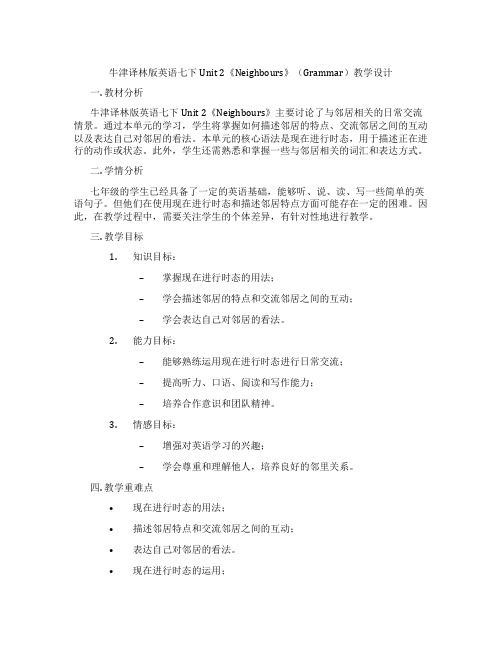
牛津译林版英语七下Unit 2《Neighbours》(Grammar)教学设计一. 教材分析牛津译林版英语七下Unit 2《Neighbours》主要讨论了与邻居相关的日常交流情景。
通过本单元的学习,学生将掌握如何描述邻居的特点、交流邻居之间的互动以及表达自己对邻居的看法。
本单元的核心语法是现在进行时态,用于描述正在进行的动作或状态。
此外,学生还需熟悉和掌握一些与邻居相关的词汇和表达方式。
二. 学情分析七年级的学生已经具备了一定的英语基础,能够听、说、读、写一些简单的英语句子。
但他们在使用现在进行时态和描述邻居特点方面可能存在一定的困难。
因此,在教学过程中,需要关注学生的个体差异,有针对性地进行教学。
三. 教学目标1.知识目标:–掌握现在进行时态的用法;–学会描述邻居的特点和交流邻居之间的互动;–学会表达自己对邻居的看法。
2.能力目标:–能够熟练运用现在进行时态进行日常交流;–提高听力、口语、阅读和写作能力;–培养合作意识和团队精神。
3.情感目标:–增强对英语学习的兴趣;–学会尊重和理解他人,培养良好的邻里关系。
四. 教学重难点•现在进行时态的用法;•描述邻居特点和交流邻居之间的互动;•表达自己对邻居的看法。
•现在进行时态的运用;•准确描述邻居特点和交流邻居之间的互动。
五. 教学方法1.情境教学法:通过设定真实的邻里场景,让学生在实际语境中学习和运用英语;2.交际教学法:鼓励学生进行角色扮演,模拟邻里之间的交流,提高口语表达能力;3.任务型教学法:通过完成小组任务,培养学生合作意识和团队精神;4.反馈与激励:及时给予学生反馈,鼓励学生积极参与课堂活动。
六. 教学准备1.教材:牛津译林版英语七下Unit 2《Neighbours》;2.多媒体课件:图片、视频、音频等教学资源;3.学习任务单:用于引导学生进行小组讨论和任务完成;4.板书用品:黑板、粉笔等。
七. 教学过程1.导入(5分钟)利用图片或视频展示邻居之间的日常生活场景,引导学生谈论自己的邻居。
牛津英语7Bunit2Neighbours表格式教案

牛津英语7Bunit2Neighbours表格式教案牛津英语7B Unit 2 Neighbours表格式教案教学目标:1. 理解并掌握本单元的重点词汇和短语。
2. 学会运用所学知识描述邻居的特点和日常生活。
3. 提高学生的听说读写能力,培养学生的合作意识和团队精神。
教学重点:1. 掌握本单元的重点词汇和短语。
2. 运用所学知识描述邻居的特点和日常生活。
教学难点:1. 运用所学知识描述邻居的特点和日常生活。
2. 听力理解和口语表达能力的提高。
教学准备:1. 教材:牛津英语7B Unit 2 Neighbours。
2. 多媒体设备。
3. 教学课件。
教学过程:Step 1: Lead-in (引入) (10 minutes)1. Greet the students and ask them about their neighbors. Encourage them to share some interesting stories or experiences about their neighbors.2. Show pictures of different types of neighbors on the screen and ask the students to describe their characteristics and behaviors.Step 2: Vocabulary (词汇) (15 minutes)1. Present the new vocabulary words to the students using flashcards or the interactive whiteboard.2. Read the words aloud and ask the students to repeat after you.3. Explain the meanings of the words and provide examples of how to use them in sentences.4. Engage the students in vocabulary activities such as matching the words with their meanings or completing sentences with the correct words.Step 3: Listening (听力) (20 minutes)1. Play an audio recording of a conversation between two neighbors.2. Ask the students to listen carefully and answer the questions related to the conversation.3. Play the audio recording again if necessary.4. Discuss the answers as a class and provide feedback.Step 4: Speaking (口语) (25 minutes)1. Divide the students into pairs or small groups.2. Ask them to discuss the following questions:a. What do you think makes a good neighbor?b. Have you ever had any problems with your neighbors? How did you solve them?c. Describe your ideal neighbor. What qualities should they have?3. Encourage the students to use the vocabulary words and phrases they have learned in their discussions.4. Monitor the students' conversations and provide assistance if needed.5. Ask some groups to share their ideas with the whole class.Step 5: Reading and Writing (阅读和写作) (30 minutes)1. Distribute the reading passage about a famous neighbor to the students.2. Ask them to read the passage silently and underline any new vocabulary words they come across.3. Discuss the passage as a class and explain the meanings of the new words.4. Ask the students to write a short paragraph describing their own neighbor using the vocabulary words they have learned.5. Collect the students' paragraphs and provide individual feedback.Step 6: Review and Summary (复习和总结) (10 minutes)1. Review the key vocabulary words and phrases with the students.2. Ask them to summarize what they have learned about neighbors in this unit.3. Encourage the students to ask any questions they may have.Step 7: Homework (家庭作业) (5 minutes)1. Assign the students to write a dialogue between two neighbors using the vocabulary words and phrases they have learned.2. Remind them to be creative and include different types of neighbors in their dialogue.教学评价:1. 教师观察学生在听、说、读、写各个环节中的表现,记录学生的参与度和理解能力。
7BUnit2Neighbours教案

7BUnit 2 Neighbours教案一、教学内容本节课选自英语教材7B Unit 2 Neighbours,主要内容包括:Lesson 11、12、13。
通过学习这三个课时的内容,让学生掌握与邻居相处相关的词汇、句型以及表达方式。
二、教学目标1. 能够听懂、会说、会读、会写与邻居相处相关的词汇和句型。
2. 能够运用所学的知识,描述与邻居之间的互动,增进邻里关系。
3. 培养学生的合作意识和团队精神,提高学生的口语表达能力。
三、教学难点与重点1. 教学难点:如何运用所学的词汇和句型,进行真实的场景交流。
2. 教学重点:掌握与邻居相处相关的词汇、句型和表达方式。
四、教具与学具准备1. 教具:多媒体设备、PPT、卡片、录音机、磁带等。
2. 学具:教材、练习本、笔等。
五、教学过程1. 导入:通过展示一组关于邻居之间互动的图片,引发学生对本节课话题的兴趣。
2. 新课内容展示:(1)展示Lesson 11的词汇和句型,引导学生跟读、模仿。
(2)利用PPT展示Lesson 12的场景对话,让学生进行角色扮演,练习对话。
(3)学习Lesson 13的语法知识,进行句子练习。
3. 实践情景引入:(1)将学生分组,每组设计一个与邻居互动的场景,运用所学的词汇和句型进行表演。
(2)邀请几组学生进行展示,其他学生进行评价。
4. 例题讲解:(1)针对本节课的重点词汇和句型,设计相关的练习题。
(2)对练习题进行讲解,巩固所学知识。
5. 随堂练习:(1)设计一份关于与邻居相处的问卷,让学生进行填写。
(2)根据问卷结果,组织学生进行小组讨论,分享自己的观点。
六、板书设计1. 7B Unit 2 Neighbours2. 主要内容:(1)Lesson 11:词汇、句型(2)Lesson 12:场景对话(3)Lesson 13:语法知识七、作业设计1. 作业题目:(1)根据所学内容,编写一个与邻居互动的场景对话。
(2)运用本节课所学的词汇和句型,描述你与邻居的一次真实互动。
最新译林牛津初一英语下册7B单元Unit2Neighbours教学设计

最新译林牛津初一英语下册7B单元Unit2Neighbours教学设计《英语》(七年级下册)Unit 2 NeighboursReading (I)I. Teaching aims and learning objectivesBy the end of the lesson, students should be able to:1. know something about the community centre;2. introduce the activities of the community centre in English;3. learn to help each other in your neighbourhood.II. Teaching contents1. New words and phrases: helpful, volunteer, community, skill, problem, something, engineer,check, broken, someone, fix, anyone, college, lucky, help sb with sth,do some shopping2. New structures: They help us with all kinds of problems.There’s something wrong with my computer.I’m going to ask a computer engineer to check it.Some college students are ready to help.III. Focus of the lesson and predicted area of difficulty1. Get the general and specific information from the conversation.2. Sum up how to introduce one’s neighbours.3. Introduce students’ own neighbours.IV. Teaching proceduresStep 1 Lead-inT: Look at the picture. It’s about the community. May I ask you some questions about your neighbours?Do you have good neighbours?What are your neighbours?What do your neighbours usually do to help each other?【设计意图:通过学生比较熟悉和感兴趣的话题导入新课,为接下来的教学做好铺垫。
牛津译林初中英语七下Unit 2 Neighbours period 4 Grammar教案

The fourth lessonGrammarTeaching aims and demands:New words: plate fireTeaching methods: task-based approachTeaching task:1.To develop an understanding of the simple future tense with ‘will’ and ‘shall’.2. To develop a n understanding of the simple future tense with ‘be going to’.3. To use “will”‘be going to’ and “shall” to talk about funture plans. Teaching aids: projectTeaching procedures:1. ask the sutents some questions about the future:What will you do this afternoon?Where shall we meet tomorrow morning?Will you be a teacher when you grow up?Ask Ss to answer the questions by using the future tense.2 . Complete the sentences用适当的动词填空1.We hope you__will_come__(come )to my party tomorrow.2.__Will__she__go__(go) to Yancheng next month ?3.Tom__will_be__(be)18 years old next year.4.Where__will__you__visit__(visit) the day after tomorrow ?5.What__are__(be)you going to do after class ?6.—__Is__he__going_to_play__(play) basketball the day after tomorrow ?—Yes, he is.3. explain the simple future tense to the students一般将来时的两种基本结构(1)由will/shall构成的一般将来时的结构肯定句:主语+will/shall+动词原形否定句:主语+will not(won't)/shall not(shan't)+动词原形疑问句:Will/Shall +主语+动词原形?特殊疑问句:What/When/Where/Who/How等+ will/shall +主语+动词原形?(2)由be going to构成的一般将来时的结构肯定句:主语+be (am,is,are) going to+动词原形否定句:主语+ be (am,is,are) not going to +动词原形疑问句:Be (Am,Is,Are)+主语+going to+动词原形?特殊疑问句:What/When/Where/Who/How等+ be +主语+ going to do sth?2.常用于一般将来时的时间状语soon不久,tomorrow 明天,the day after tomorrow后天,this afternoon今天下午,this evening 今天晚上,this year 今年,in the future 在将来,in two weeks/days 两周/天后,next week/month/year/summer下周/下个月/明年/明年夏天3.两种基本句型的区别(1)“主语+be going to+动词原形”表示一个事先考虑好的意图,相当于中文的“打算,计划,准备”;而“will/shall”则表示一种意愿,是未经考虑的意图。
牛津译林版七年级下册Unit 2《Neighbours》(Grammar)教学设计
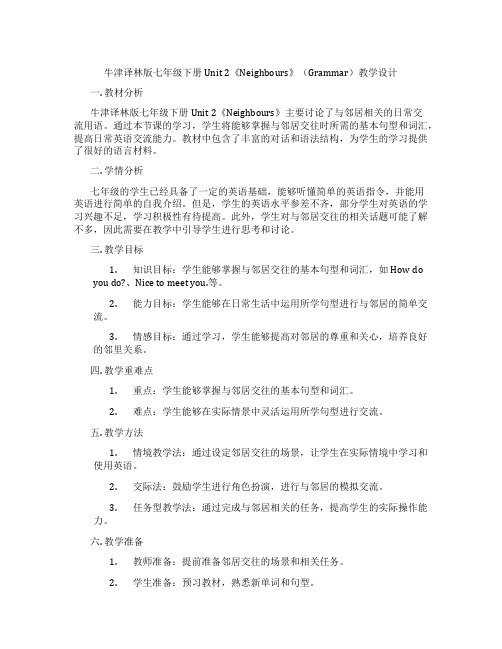
牛津译林版七年级下册Unit 2《Neighbours》(Grammar)教学设计一. 教材分析牛津译林版七年级下册Unit 2《Neighbours》主要讨论了与邻居相关的日常交流用语。
通过本节课的学习,学生将能够掌握与邻居交往时所需的基本句型和词汇,提高日常英语交流能力。
教材中包含了丰富的对话和语法结构,为学生的学习提供了很好的语言材料。
二. 学情分析七年级的学生已经具备了一定的英语基础,能够听懂简单的英语指令,并能用英语进行简单的自我介绍。
但是,学生的英语水平参差不齐,部分学生对英语的学习兴趣不足,学习积极性有待提高。
此外,学生对与邻居交往的相关话题可能了解不多,因此需要在教学中引导学生进行思考和讨论。
三. 教学目标1.知识目标:学生能够掌握与邻居交往的基本句型和词汇,如How doyou do?、Nice to meet you.等。
2.能力目标:学生能够在日常生活中运用所学句型进行与邻居的简单交流。
3.情感目标:通过学习,学生能够提高对邻居的尊重和关心,培养良好的邻里关系。
四. 教学重难点1.重点:学生能够掌握与邻居交往的基本句型和词汇。
2.难点:学生能够在实际情景中灵活运用所学句型进行交流。
五. 教学方法1.情境教学法:通过设定邻居交往的场景,让学生在实际情境中学习和使用英语。
2.交际法:鼓励学生进行角色扮演,进行与邻居的模拟交流。
3.任务型教学法:通过完成与邻居相关的任务,提高学生的实际操作能力。
六. 教学准备1.教师准备:提前准备邻居交往的场景和相关任务。
2.学生准备:预习教材,熟悉新单词和句型。
七. 教学过程1.导入(5分钟)教师通过提问方式引导学生谈论他们认识的邻居,并分享邻居之间的趣事,激发学生的学习兴趣。
2.呈现(10分钟)教师展示邻居交往的场景,引导学生关注其中的角色和情节。
然后,教师呈现教材中的对话,让学生听懂并理解对话内容。
3.操练(15分钟)教师学生进行角色扮演,模拟邻居交往的场景,让学生在实际操作中掌握所学句型和词汇。
牛津译林英语七年级下册7B Unit 2 Neighbours全套教案

牛津译林英语七年级下册7BUnit 2 Neighbours全套教案Period 1【教学目标】知识目标To grasp the words: neighbor, will, visitor, likeTo grasp the sentences: I’m going to visit our new neighbours.能力目标能识别并掌握各种职业及工作场所的名称。
情感目标能用简单的英语谈论自己所居住的社区。
【教学重难点】1.能识别并掌握各种职业及工作场所的名称。
2.能用简单的英语谈论自己所居住的社区。
【教学过程】Step I复习1.教师向学生呈现一篇日记,让他们用场所的名称填空。
2.与学生就个子的居住状况进行交流。
教师说:Where do you live? What kind of home do you have? What’s around your home? Is your home near a park/a school/a restaurant/a supermarket? Is there a shop/a factory/a cinema/a museum/a hospital near your home?Step II 呈现1.Who lives next to your flat/house? Who livestock above/below you? Who’s your neighbour? What’s your neighbour’s name? What does he/she do?2.Mr. Lin is my neighbour. He’s a waiter in a big restaurant. Miss Huang lives above me. She’s a teacher.Step III操练1.指导学生完成A部分的联系。
2.指导学生两人一组进行对话,了解彼此邻居的职业情况。
2015新版牛津译林版7BUnit2Neighbours学案
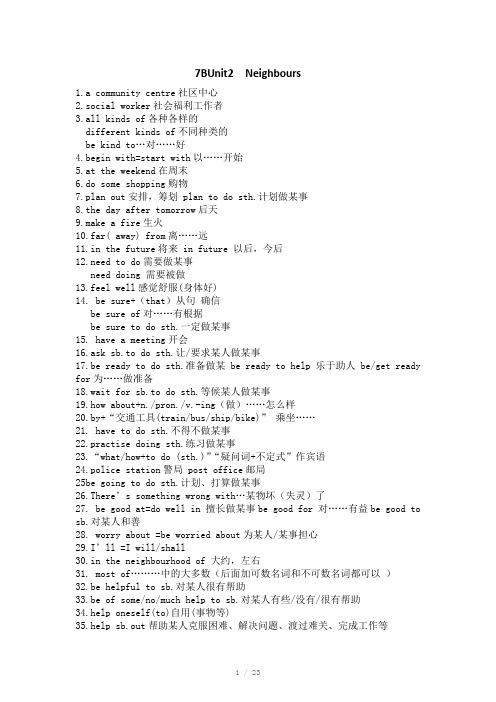
7BUnit2 Neighbours1.a community centre社区中心2.social worker社会福利工作者3.all kinds of各种各样的different kinds of不同种类的be kind to…对……好4.begin with=start with以……开始5.at the weekend在周末6.do some shopping购物7.plan out安排,筹划 plan to do sth.计划做某事8.the day after tomorrow后天9.make a fire生火10.far( away) from离……远11.in the future将来 in future 以后,今后12.need to do需要做某事need doing 需要被做13.feel well感觉舒服(身体好)14. be sure+(that)从句确信be sure of对……有根据be sure to do sth.一定做某事15. have a meeting开会16.ask sb.to do sth.让/要求某人做某事17.be ready to do sth.准备做某be ready to help 乐于助人be/get ready for为……做准备18.wait for sb.to do sth.等候某人做某事19.how about+n./pron./v.-ing(做)……怎么样20.by+“交通工具(train/bus/ship/bike)”乘坐……21. have to do sth.不得不做某事22.practise doing sth.练习做某事23.“what/how+to do (sth.)”“疑问词+不定式”作宾语24.police station警局 post office邮局25be going to do sth.计划、打算做某事26.There’s something wrong with…某物坏(失灵)了27. be good at=do well in 擅长做某事be good for 对……有益be good to sb.对某人和善28. worry about =be worried about为某人/某事担心29.I’ll =I will/shall30.in the neighbourhood of 大约,左右31. most of………中的大多数(后面加可数名词和不可数名词都可以)32.be helpful to sb.对某人很有帮助33.be of some/no/much help to sb.对某人有些/没有/很有帮助34.help oneself(to)自用(事物等)35.help sb.out帮助某人克服困难、解决问题、渡过难关、完成工作等36.with the help of 在……的帮助下37. .help sb.(to) do sth.帮助某人做某事 help sb. with sth.帮助某人某事38.help to do sth.有助于做某事39.be lucky to do sth.幸运做某事40.You’re welcome./That’s OK./That’s all right./Not at all. 不用谢。
牛津译林版七年级英语下册《Unit 2 Neighbours》学案(4)

《Unit 2 Neighbours》学案Grammar(1)一、【学习目标】1.熟练掌握本课生词和短语2. 学习一般将来时,能用will, shall表示将来。
3. 能正确使用will, shall的一般将来时的肯定、否定、疑问形式和肯否定回答。
二、【学习重难点】一般将来时的肯定、否定、疑问形式和肯否定回答。
三、【自主学习】翻译短语:1后天_____________________________2 生火__________________3…有问题__________ 4 叫某人做某事__________________5 等候_________6 回电话________7 不用谢_________________8看电影_____________9下周__________________四、【合作探究】1.小组讨论预习中存在的问题,老师点拨。
2.引导学生自主学习书第23页表格。
讨论总结一般将来时(will/shall)的概念、构成情况、基本句型变化。
3 .完成书23页练习,两人一组互问互答。
五、【达标巩固】㈠用所给词的适当形式填空:①Listen! Daniel _______________ (sing) an English song.②We___________(have) a dinner in a restaurant next week③_________ we _________(see) a film this afternoon?④He ____________(watch) a football match on TV tonight.⑤It’s 4.30 in the after noon. The students ________(clean) the classroom.⑥My brother __________(do) his homework this Sunday.㈡句型转换:He will play bask etball after school.否定句He_______ _____basketball after school一般疑问句____he _____ basketball after school?肯定回答:______,_____ ______ 否定回答:____,_____ _____对划线部分提问______ _____he play basketball?教师的职务是‘千教万教,教人求真’;学生的职务是‘千学万学,学做真人’。
牛津译林初中英语七下Unit 2 Neighbours(第4课时)》教案 .doc
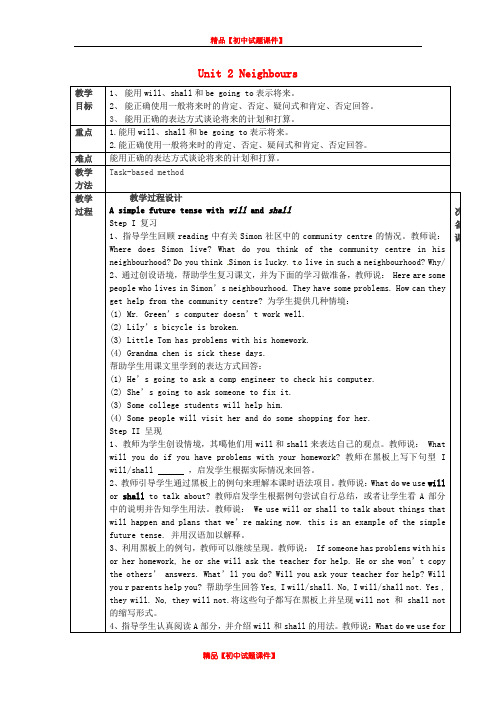
(2) Lily’s bicycle is broken.
(3) Little Tom has problems with his homework.
(4) Grandma chen is sick these days.
难点
能用正确的表达方式谈论将来的计划和打算。
教学
方法
Task-based method
教学
过程
教学过程设计
A simple future tense withwillandshal l
Step I复习
1、指导学生回顾reading中有关Simon社区中的community centre的情况。教师说:Where does Simon live? What do you think of the community centre in his neighbourhood? Do you think Simon is lucky t o live in such a neighbourhood? Why/
2、接着教师引导学生看黑板上的例句并引导他们理解be going to的用法。启发学生自我总结或看B部分的说明并告知学生用法。教师说:We use be going to talk about something we decide to do an d thing s that will p robably happen.用汉语加以解释。
Unit 2 Neighbours
教学
目标
1、能用will、shall和be going to表示将来。
2、能正确使用一般将来时的肯定、否定、疑问式和肯定、否定回答。
七年级英语下册Unit2Neighbours(第4课时)教案(新版)牛津版

七年级英语下册Unit2Neighbours(第4课时)教案(新版)牛津版Unit 2 NeighboursGrammarI. Teaching aims and learning objectivesBy the end of the lesson, students should be able to:1. know what the simple future tense is;2. learn how to use the simple future tense correctly;3. talk about things that will happen in the future.II. Teaching contentsNew words and phrases: shall, fire, the day after tomorrow, make a fireIII. Focus of the lesson and predicted area of difficulty1. To use the simple future tense correctly.2. To talk about the actions that will happen in the future.IV. Teaching proceduresA Simple future tense with will and shallStep 1 Revision1. Enjoy a song.T: First, please enjoy a song. Let’s sing together. How will the school be today?2. About Simon.(1) Where does Simon live?(2) What do you think of his neighbours?(3) Do you think Simon is lucky to live in such a neighbourhood? Why?3. About Simon’s neighbours.T: Some of Simon’s neighbours have some problems. How can they get help from the community centre?T: In these sentences, we use be going to and will to talk about things that will happen in the future. This tense is called the simple future tense.Step 2 Presentation1. wil l + verb …T: Neil and Jack are my new friends. Let’s listen to a story about them, and then answer the following questions.(1) How old will Jack be?(2) What will Neil buy for Jack?(3) How many miles will Jack run each day?T: We use will + verb…to expr ess the simple future tense.2. will or shall.(1) Match the subjects on the left with will or shall on the right.(2) Learn about some short forms about will and shall.(3) Read a chant.3. The basic form.Complete the tables about the simple future tense with will or shall.4. The usage of the simple future tense with will or shall(1) Use will or shall to complete the sentences.We use will or shall to talk about things that are sure to happen in the future.(2) Ask and answer in pairs: What will you do this evening?We use will or shall to talk about plans that we are making now.Step 3 Practice1. Complete the conversation.T: Complete the conversation between Mr Lin and Simon with the simple future tense of the verbs in brackets.2. Pair work.T: Work in pairs and talk about what you will do this weekend.B Simple future tense with be going toStep 1 Presentation1. More about Neil and Jack.T: Do you want to know more about Neil and Jack? Let’s watch the video and find out where Jack is going and what he is going to do.T: We use be going to do…to express the simple future tense.2. Match the subjects with be going to.3. Learn about some short forms about be going to.4. Work out the basic form.T: Complete the tables about the simple future tense with be going to.5. The usage of the simple future tense with be going to.(1) Use be going to to talk about something we decide to do.(2) Pair work.T: Jack will be 50 years old in two days. Work in pairs and talk about what you are going to buy for him.(3) Use be going to to talk about things that will probably happen.(4) Fill the blanks with the correct forms of be going to.Step 2 Practice1. Complete the conversation.T: Simon is going to have a day out with his uncle’s family the day after tomorrow.Complete his conversation with Amy by using the correct forms of be going to.2. Plan a day out for Neil and Jack.T: Is Neil really going to buy a car for Jack?T: Work in groups of four and plan a day out for Neil and Jack. Here are some points which may help you. Remember to use the simple future tense we learned today. Step 3 Summary T: Boys and girls, today we’ve learnt the simple future tense.(1) What do we use the simple future tense to talk about?(2) Do you still remember the basic forms of the simple future tense?(3) When shall we use the simple future tense?(4) What time expressions are always used with the simple future tense?V. HomeworkFinish writing the visiting plan for Neil and Jack.【教学反思】。
牛津译林初中英语七下Unit 2 Neighbours period 4 Grammar教案

The fourth lessonGrammarTeaching aims and demands:New words: plate fireTeaching methods: task-based approachTeaching task:1.To develop an understanding of the simple future tense with ‘will’ and ‘shall’.2. To develop a n understanding of the simple future tense with ‘be going to’.3. To use “will”‘be going to’ and “shall” to talk about funture plans. Teaching aids: projectTeaching procedures:1. ask the sutents some questions about the future:What will you do this afternoon?Where shall we meet tomorrow morning?Will you be a teacher when you grow up?Ask Ss to answer the questions by using the future tense.2 . Complete the sentences用适当的动词填空1.We hope you__will_come__(come )to my party tomorrow.2.__Will__she__go__(go) to Yancheng next month ?3.Tom__will_be__(be)18 years old next year.4.Where__will__you__visit__(visit) the day after tomorrow ?5.What__are__(be)you going to do after class ?6.—__Is__he__going_to_play__(play) basketball the day after tomorrow ?—Yes, he is.3. explain the simple future tense to the students一般将来时的两种基本结构(1)由will/shall构成的一般将来时的结构肯定句:主语+will/shall+动词原形否定句:主语+will not(won't)/shall not(shan't)+动词原形疑问句:Will/Shall +主语+动词原形?特殊疑问句:What/When/Where/Who/How等+ will/shall +主语+动词原形?(2)由be going to构成的一般将来时的结构肯定句:主语+be (am,is,are) going to+动词原形否定句:主语+ be (am,is,are) not going to +动词原形疑问句:Be (Am,Is,Are)+主语+going to+动词原形?特殊疑问句:What/When/Where/Who/How等+ be +主语+ going to do sth?2.常用于一般将来时的时间状语soon不久,tomorrow 明天,the day after tomorrow后天,this afternoon今天下午,this evening 今天晚上,this year 今年,in the future 在将来,in two weeks/days 两周/天后,next week/month/year/summer下周/下个月/明年/明年夏天3.两种基本句型的区别(1)“主语+be going to+动词原形”表示一个事先考虑好的意图,相当于中文的“打算,计划,准备”;而“will/shall”则表示一种意愿,是未经考虑的意图。
牛津译林初中英语七年级下册Unit 2 Neighbours教案4

7B Unit 2 NeighbourTeaching points:Aim 2Teaching steps:Step1 Revision1)Where does Simon live?2)What3)Do you think Simon lucky to live in such a nighourhood? Why?2.Here are some peopl’t work well.2) Lily bicycle is broken.3) Little Tom has problems with his homework.4) Grandma Chen is sick these days.Help Ss answer these questions from the text.Step2 Presentation1.创设情景-What will you do if you have problems with your homework?-I will/shall________.2. What do we use will or shall to talk about?(We use will or shall to talk about things that will happen and plans that we’re making now. This is an example of the simple future tense).1.If someone has problem with his or her homework, he or she will ask the t eacher for help. He or she won’t copy the other’s answers.What’ll you do? Will you ask your teacher for help? Will your parents help you?(Help Ss answer them like “Yes, I will/shall. No, I will/shall not. Yes, they will. No, they will not).2.Read partA carefully and find out the rulers.(What do we use for “I” or “we”? What do we use for “you”“he” “she” “it” and “they”Step3Practise1.Do the practice of Part A2.Read the dialogue about Mr Lin and Simon’s.Step4 Presentation1.创设情景is going to have a “helping hands’meeting the day after tomorrow. I’m going to teach children English songs. My daughter is going to dance for the old people. My parents are going to cook some delicious food.2.What do we use be going to totalk about?(We use be going to to talk about something we decide to do and things that will probably happen).3.1)Are you going to join the “helping hand” meeting in yourneighourhood?2)Is your father going to do sth for the old people?3)What’s he going to do ?4) What’s your mother going to do?5)What are your neighours going to do ?4.Look at the part B and find out the rulers.Step4 Practice1.(Simon is telling Amy about his plan for a day o2.Answ er these questionswith your partner.1)What are you going to do for old people this Sunday?2)What’s your father/mother going to do for your neighourstomorrow?3)What are you going todo for poor children the day after tomorrow?4)。
- 1、下载文档前请自行甄别文档内容的完整性,平台不提供额外的编辑、内容补充、找答案等附加服务。
- 2、"仅部分预览"的文档,不可在线预览部分如存在完整性等问题,可反馈申请退款(可完整预览的文档不适用该条件!)。
- 3、如文档侵犯您的权益,请联系客服反馈,我们会尽快为您处理(人工客服工作时间:9:00-18:30)。
Unit 2 Neighbours Period 4 Grammar一、翻译词组。
【解题指导:先复习,再作业,背诵重点例句】1.今天下午_______________________________2.需要些帮助_____3.我随身带把伞4.等我们回电话5.等你电话6.计划一天外出_____________________________7.我叔叔的家人8.带一些水___9.生火10.为妈妈煮美食11.拜访我的新邻居12.观看电影________________________________ 13.下周五14.先给他打电话____________________________二.用所给词的适当形式填空。
【解题指导:圈出解题的关键词】1.I _______________(not go) shopping today, but she will.2.—__________ there ______________(be) a sports meeting this weekend? —Yes, there is. 3.__________ you ____________(leave) for Paris tomorrow morning?4.—How long ____________ you _____________(stay) here? —I'm not sure.5. ---Who usually _________________ (cook) breakfast for you at home? ---My mother does.6. It’s seven now. Simon __________________ (help) his sister with Maths.7. Hurry up, Kitty! The bus _____________________ (come).8. They _____________________ (not invite) Mr. White if he can’t get back from Wuhan tomorrow.9. ---When ___________ the engineer _______________ (be) free? ---This afternoon.10. ---Who __________________ (sing) at the party tomorrow? --- Miss Wang.三、翻译句子。
【解题指导:先复习,再作业,背诵重点例句】1.现在是7:30了。
他要迟到了。
It’s seven thirty now. He _________ _________ _________ _________ late.2.我们正在计划后天外出一天。
We are _________ _________ ________ ________ the day _________ _________.3.他打算这周日下午叫一名工程师来帮他检查电脑吗?_________ he going to _________ _________ _________ to _________ the computer for him this Sunday afternoon?4.生火很容易。
_________ easy _________ _________ _________ _________.5.这周末你们将在什么地方举行聚会?Where ________ you ________ ________ ________ this weekend?6.你将等我回电话吗?_________ you wait _________ me _________ _________ _________?四、单项选择。
【解题指导:看完整题干和选项,全盘考虑,注意人称、时态、句式和搭配】( ) 1. Jack, with his brothers, ___________ visit their neighbors this afternoon.A. is going toB. goes toC. are going toD. go to( )2.My uncle is a policeman. He works in ________.A.a company B.an office C.the police station D.the post office( )3. ---The museum opens at 9 o’clock. ________ we meet at 8:30? ---Great.A. DoB. ShallC. WillD. Does( )4. ---Why are you so happy?---There ________ a TV show about my favourite film star tomorrow.A. isB. is going toC. will haveD. is going to be( )5.—Do you go to school ________ bus? —No, I go to school ________ my bike.A.by; on B.by; by C.on; on D.on; by( )6.—What ________ Bob going to buy?—He is going to buy some plates and forks. What ________ we buy then?A.are; shall B.will; will C.is; are D.is; shall( )7..—________ the Wangs ________ the Great Wall tomorrow? —Yes, they are.A.Is; going to climb B.Are; going to climb C.Will; climb D.Shall; climb ( )8.—What is your plan for next weekend, Lingling? —I ________ volunteer work in the museum.A.was doing B.did C.have done D.am going to do( )9.If you want to visit the Palace Museum, I ________ tickets for you tomorrow.A.will book B.booked C.have booked D.was booking五、句型转换,每空一词。
【解题指导:看清题目要求,注意时态、人称和句式】1. Many volunteers are going to help the people in Wuhan. (改为一般疑问句并作肯定回答)_________ many volunteers _________ _________ help the people in Wuhan?_________, they _________.2. We shall meet some Western doctors in this city. (改为否定句)We _________ meet _________ Western doctors in this city.3. My grandparents will see us this weekend. (对划线部分提问)_________ _________ your grandparents _________ _________?4. My cousin is going to visit the Great Wall this summer. (对划线部分提问)_________ _________ your cousin going to _________ this summer?六、完型填空。
【解题指导:细致阅读,在文章划出可以解题的短语或句子】Today, I'll talk about the problems we have these days. The problems of dogs and the objects falling from windows are getting 1 . We have received a lot of letters 2 such problems, so it's time to work out these problems.Some dogs aren't taken good care of, and they 3 make mess (粪便) on roads and in gardens. This makes our community dirty. I'd like to tell the dog-owners that 4 behavior is too bad, and they are always making people feel unhappy.Some people throw rubbish out of the 5 . It's dangerous because falling objects may hurt 6 . You know, it is against the law. We should 7 a notice to teach people not to do so. If it's found, we'll record the names and 8 of those people. Then, a written warning will be sent to their homes and they will 9 by law.A safe and comfortable living environment is important to us. 10 we try our best to care for our community, it will be a good place to live in.( )1. A. easier B. worse C. better D.good( )2. A. about B. except C. without D.with( )3. A. busily B. suddenly C. freely D.carefully( )4. A. his B. their C. our D.her( )5. A. dogs B. doors C. cars D. windows( )6. A. other B. the other C. others D.another( )7. A. put up B.look up C. put away D.put off( )8. A. hobbies B. addresses C. experiences D.homes( )9. A. punish B. be punishing C. punished D. be punished( )10. A. If B. Before C. Although D.Because。
